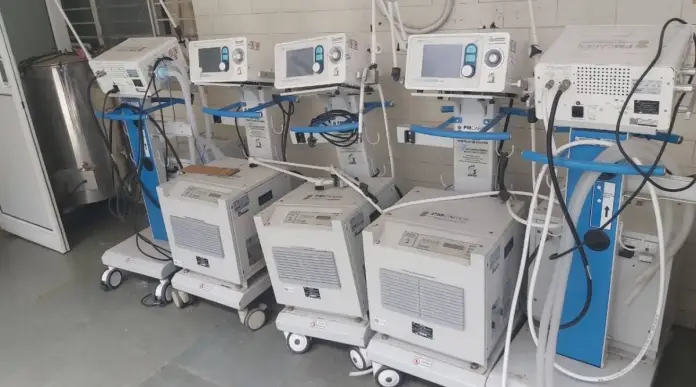Kusumakumari

Modern equipments have made body check up easy of the medical practitioners. Of course, well maintained sophisticated machineries area a boon to medical science and health practitioners, to identify the physical condition of the patient with precision and pace. But what will happen if the machine is not well maintained or erroneously calibrated? The diagnosis is could deceive the doctor. The medical practitioners mostly prescribe treatment as per the available diagnostic report. There is every chance the report generated by a poorly calibrated medical equipment go wrong or incorrect. Such incorrect diagnostic reports are bound to endanger precious human lives. As a senior medical practitioner confirms “medical doctors mostly depend on the diagnostic reports from pathological labs for prescribing medication and treatments. If these reports are not precise and perfect we may go wrong in our prescription.”
It is a fact; the accuracy of the medical device has great significance in human life, as the report generated by faulty equipment can seriously affect the diagnostic procedure. As a technician dealing with medical equipment pointed out “the deviation in output is not necessarily the fault of the device itself, nor can it represent the manufacturer’s incompetence. Most commonly, it results from continuous device usage, which over time affects its internal components, resulting in a deviation from the device standard measurement output. So the only remedy is timely and regular calibration of the machines by agencies having expertise. “
According to the Weights and Measures Act, accuracy of the weighing machines has to be ascertained annually, without fail. But the same alacrity is not shown by the authorities in ascertaining the quality of the medical devices used for detecting human body conditions. It goes without saying, any Incorrect diagnose will lead to serious errors in treatment and that could ultimately endanger precious human lives in many numbers.
For example x-ray, different types of scanning, pathological tests, recording of body temperature and weight. A thermometer can be calibrated by the hospital staff themselves with the help of hot water and a temperature calibrator without much technical knowledge. It is a pity that even such simple calibration is not done in the hospitals. A technician who visited a private hospital to calibrate certain medical equipments found that a thermometer found there always showed 36 degree F. If this is the case of simple equipment like thermometer what could be the condition of other high-end machines used for serious medical examinations?
To ensure proper treatment results of the concerned medical examination should be precise and perfect. For that the machines and equipments used have to be properly calibrated. To ascertain quality of healthcare and treatment it is highly essential to do detailed periodical calibration of critical medical equipments like ventilators. To my understanding, this is hardly done and the patients are put to risk. In most of the ventilators the oxygen level is not properly displayed for it is not calibrated. This is vital mistake. How could the medical doctor or the nurse understand the condition of the patient if oxygen level is not properly displayed?
The case is same with pathological labs. The same tests done in three different labs will show three different results. This could possibly confuse the medical doctor and the patients alike. If the equipments are properly calibrated the results would have been one and the same in all the labs.
There are cases of faulty medical equipments misleading the doctors performing critical surgeries. If the Multi-parameter monitor fitted the patient malfunctions, the critical body conditions like flow of oxygen, heartbeat, pulse rate etc will not be correctly displayed. The surgeon may misjudge the condition of the patient. A momentary leakage through the multi-parameter monitor attached to the body to monitor ECG, blood pressure, body temperature, and oxygen levels can prove critical. It may be a small change in joule energy given to the body by the output of the Defibrillator, a device used to restore the function of the stopped heart. Improper reading of a medical device can cost a precious life.
My suggestion is calibration of medical equipments has to be done only and only by responsible government agencies having proven expertise. Erroneous medical equipment has to be returned to the original manufacturer and should be replaced with perfectly calibrated machines. This is essentially complied because faulty diagnostic results can endanger your life.
The medical department which is highly pretentious of its efficiency and alertness is hardly concerned of quality checking of medical equipments used in the state. There is urgent need of calibration of medical equipment on a yearly basis. Most importantly periodical electrical safety testing of medical equipments has to be made mandatory. Unfortunately, that is not being done and the patients are put to risk. All electrical equipment should be tested for electrical safety at least once a year using an Electrical Safety Analyzer before attaching to the patient’s body.
All medical equipment is critically important. Radiation-related devices such as X-ray equipment, MRI scanning device, and CT scanning equipment have to be tested for electrical safety and needs to be properly calibrated periodically. Proper earthing and other necessary safety tests have to be done before connecting the devices to the patients to ensure safety. A faulty device can endanger the patient. Even a slight variation in the current flow can cause death.
It is a must; all medical devices have to be properly calibrated to ensure error free treatment and safety of the patient. Similarly, any new medical device has to induct into the system only after thorough scrutiny, analyzing and ensuring all parameters are perfect. But it is learned that there is no system existing for any such scrutiny or quality assurance.
There are one or two Central Government Departments functioning in Kerala with tested facilities for flawless calibration of certain equipments, but not all. A law needs to be enacted in accordance with the Clinical Establishment Act, to ensure quality of the medical equipments.
Surprisingly many subscribe to faulty practices like managing calibration stickers to evade any punitive actions. Huge money is transacted for such illegal practices. This is dangerous and needs to be firmly dealt with. If any medical equipment is found malfunctioning or not properly calibrated that has to be sent back to the respective manufacturer for repair instead of trying to “manage” it locally as there is no facility to repair such critical equipments here in the state..
My suggestion is, strengthen the biomedical department in every hospital so that the biomedical engineers who have studied the device can detect and rectify the errors.
Malfunctioning of critical instruments like infusion pumps and syringe pumps, which dispense the correct amount of medication into the body of a patient in the ICU, can endanger the life of the patient. Such instruments need to be properly calibrated to ensure safety of the patient.
Leakage of radiation from a mammography device, such as a breast augmentation device, can cause health hazards, because the leaked radioactive rays could affect the uninfected parts of the body. Such devices, and the locations where the devices are in operation needs to be tested for safety by the Atomic Energy Regulatory Board (AERB). Periodical tests and calibrations by the AERB or other competent agency have to be made mandatory for the radiation devices AERB or other agencies they accredit.
In developed countries like the United States non calibration and non-testing of medical equipments is a criminal offence that can attract many years of imprisonment coupled with monetary penalty. This could be the reason many of our elected representatives and others go abroad for medical treatment. You can blindly trust the medical device there. The result of pathological tests will be will be the same in any laboratory.
Kerala is known as the diabetic capital of the world. It has become a common ailment. But how many labs have accurately calibrated devices to measure blood sugar? Do we have any system to check whether medical devices are being calibrated? The equipment sold in the market to check blood sugar is not calibrated and the manufacturers are going merry selling multiple million units of such “gluco meters” and getting treated for diabetic. Who knows if the readings from such instruments are proper and correct? To whom will the public know and understand all this? Therefore, a law to ensure quality of the medical equipment is urgent to safeguard the life of the public.
It was a welcome imitative from the state government to set apart Rs 3.5 cr for starting medical device incubation in 2015-16 budgets. But nothing much has happened except allocation of the fund. To ensure safety of human health a serious initiative has to be there to regulate the many thousands of ill equipped pathological labs and poorly managed money minded private hospitals. Such medical institutions with scant or poor facilities are a serious threat to human health and it is high time government swing into action.
*The author is a technical expert in electronic equipment calibration.


